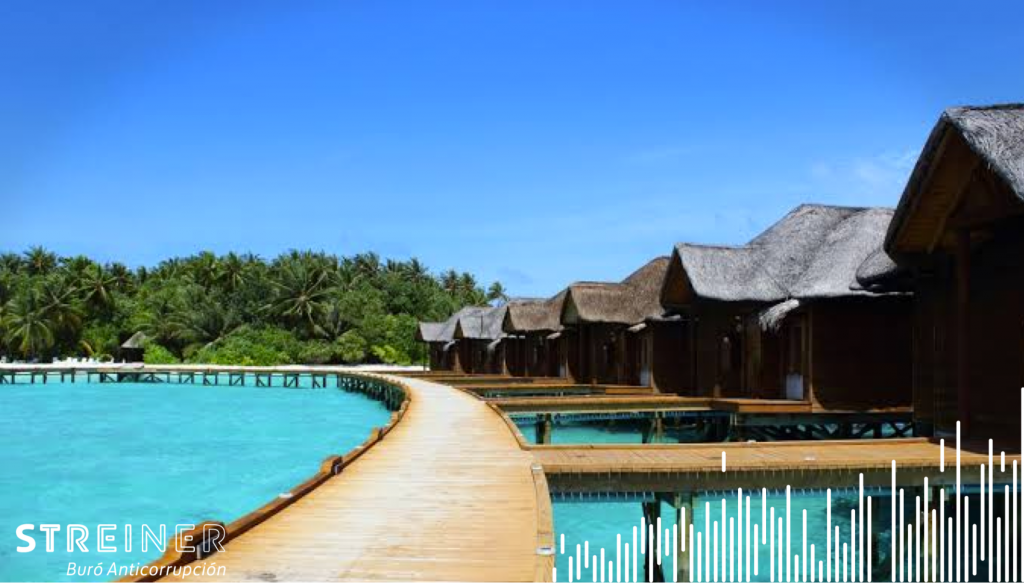Corrupt Tourism in the Maldives
Por: Laura Paola Villa García | Posted on November 5, 2019
Context
Maldives is made up by almost 1,200 islands in the Indian Ocean and one of the most important industries is tourism as it has 87 resorts in 9 atolls with a total of about 16,000 beds (Maldives, 2019). Due to the importance of this industry, the government issued regulations to deter social impacts such as imposing suspensions for constructions of new resorts and initiated planning of tourism on its islands (Maldives, 2019).
Facts: Who gave what to whom and why?
The corruption scandal that plunged the Maldives involved local businessman, international developers and President Abdulla Yameen who embezzled approximately US$79 million from leasing out islands and submerged coral lagoons to tourist developers in no bid deals (Press, 2019).
Maldives’s internal law requires that leases should be given in public bidding process, however, investors negotiated leases with then vice president and tourism minister Adeeb and signed contracts with Maldives Marketing and Public Relations Corporation (MMPRC), institution that had no authority in the process. Later the money was syphoned off from the MMPRC to private bank accounts (Press, 2019).
The Organized Crime and Corruption Reporting Project (OCCRP) used leak data such as internal government records to discover which hotels were implicated in the scandal. Some of the companies involved were Universal Resorts, Soneva and others that lent their names to other companies that leased such as Meliá Hotels and Westin Hotels and Resorts (Press, 2019).
One scandal that erupted during that time was the one involving entrepreneur Mr. Ong Beng Seng, who had given hotel accommodation gifts to Tourism Prime Minister Adeeb and President Yameen when Beng Seng was looking for opportunities in the islands. Furthermore, the OCCRP found evidence that the president had intervened in business in which permissions for islands and lagoons were granted via leasing (Press, 2019).
This year Adeeb testified in open court that he had participated along with the former president in corrupt deals and that part of the money involved was laundered and then transferred to Yameen’s bank account (Anticorruption, 2019).


Law
United Nations Convention Against Corruption
Maldives Prevention and Prohibition of Corruption Act, 2000
Why the case is relevant?
This case is relevant for anti-corruption purposes as it shows the scheme of corrupt tourism and invites international hoteliers t question whether the land their hotels are operating on has been acquired through legitimate procedures and respecting national laws. As Niyaz Ibrahim pointed out, hotel chains have the obligation to revise that contracts are done legally and ethically and therefore they need to do due diligence before they get involved in these deals (Press, 2019).
The concept of Responsible Tourism is raised in a very relevant manner in the Maldives case as there is a need to question social and corporate responsibility of hotel giants and entrepreneurs.
Lessons learned
From this case we can learn that due diligence is necessary in order to assure that business transactions are done legally and ethically. According to the International Chamber of Commerce, due diligence refers to the background investigation conducted on a company considering contracting with. This tool aims to mitigate corruption as it evaluates possible risks of contracting with a thirds party and whether those risks represent an obstacle to enter into the contract or not (International, 2019).
If hoteliers had considered due diligence, probably they would find red flags, which world would have led them to question the legality of public procurement processes.
What type of corruption is it and what are the crimes involved?
This is a case of political as there was a manipulation of policies, institutions and rules of procedure in the allocation of resources by political decision makers, who sed their power to sustain their position and wealth (Anticorruption, 2019). In Maldives Case Adeeb and Yamen manipulated the public procurement process through the Maldives Marketing and Public Relations Corporation (MMPRC) in order to syphon off resources to their personal accounts.
Also, it is considered grand corruption due to the fact that there was an abuse of high-level power that benefited many and caused harm amongst society (Anticorruption, 2019). The Maldives citizens obviously are affected by corruption which only benefits hotelier giants and corrupt politicians, while they are left to deal with the lack of resources and the social and environmental impact caused by hotel chains in their islands.
Furthermore, there was foreign bribery involved because allegedly Mr. Ong Beng Seng, offered hotel accommodation gifts to Tourism Prime Minister Adeeb and President Yameen when Beng Seng was looking for business opportunities in the islands.

References (Harvard – Anglia)
International, T., 2019. Transparency International the global coalition against corruption. [Online]
Available at: https://www.transparency.org/en/glossary
Press, A., 2019. The Diplomat. [Online]
Available at: https://thediplomat.com/2019/08/maldives-ex-vice-president-testifies-in-corruption-case-against-ex-president-yameen/
Maldives, T. I. i., 2019. Tourism. [Online]
Available at: dehttps://www.tourism.gov.mv/pubs/TourismIndustryinMaldives/overview.htm
Anticorruption, I., 2019. ICC Anticorruption. [Online]
Available at: https://iccwbo.org/content/uploads/sites/3/2015/07/ICC-Anti-Corruption-Third-Party-Due-Diligence-Spanish-Version-1.pdf
Transparency, 2018. Transparency. [Online]
Available at: https://www.transparency.org/news/feature/paradise_lost_among_maldives_dodgy_land_deals
